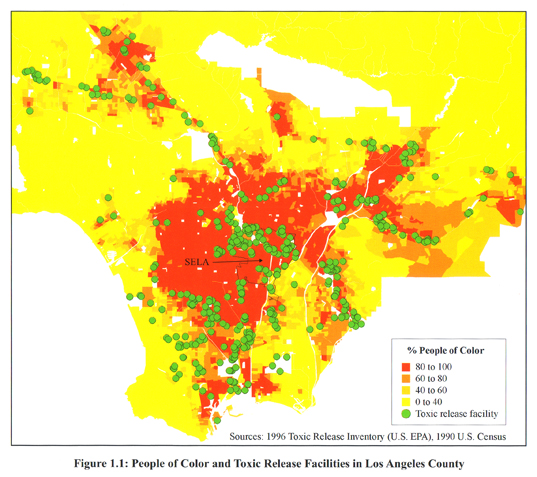Written by Jay Luce Nelson, UC Santa Cruz student and Chancellor's Undergraduate Intern for the Sustainability Office
Source: 1996 Toxic Release Inventory (U.S. EPA), 1990 U.S. Census.
To me, social sustainability is just as important as environmental sustainability. Where environmental sustainability seeks to take care of our nonhuman environment, social sustainability cares for cultures and communities. If the idea of sustainability as a whole is to preserve and improve future generations’ standard of living, how can we hope for a better future for all without addressing racism, ableism, cissexism, and other systems of oppressive power dynamics? For me, the ideal form of sustainability activism combines both human and nonhuman aspects and celebrates the achievements and contributions of marginalized groups while challenging societal systems of power and oppression.
Before I go on, I want to say that nothing I am saying here is new. This information is out there if you look, already discussed by people who know far more about sustainability than I do at a much more personal level, many of whom are people of color speaking out about their own experiences. The information might be scattered through short personal blog posts and comments on news reports, but it is out there.
There is plenty to say about sustainability as a whole—and even environmental sustainability specifically—that demands more attention than it currently receives. There is always a need to discuss the destructive roles of colonization, colonialism, racism, industrialization, and capitalism in our treatment of the land, particularly in the United States but in other previous colonies as well. (A particularly horrifying yet rarely discussed example is the millions of deaths resulting from Belgium’s demand for collection of rubber from rubber trees in the Congo, documented in Adam Hochschild’s book King Leopold’s Ghost.) There is a need to address ongoing environmental racism in urban planning. There is always a need to discuss native land practices, which have often been formed over time through long processes of learning about the unique traits of the land, and recognize that there are and always will be people following these practices.
These issues will not go away in time if they are not addressed. I encourage everyone to look into these and search for the opinions and experiences of the lives these issues have affected. Academia is credible, but it cannot overshadow individuals. I wish I had more resources than I actually do regarding these vital topics but, for me at least, the greatest resource has always been listening to others about their experiences. Much of what I know about sustainability I learned in high school from paying attention on microblogging platforms and social media. I know that there is always more for me to learn.
So keep listening to others. Keep learning. Do not let academia detach you from the emotions of those that sustainability initiatives affect. And most of all, keep thinking about the root causes of these issues and addressing the systems of power and oppression behind them.

No comments:
Post a Comment